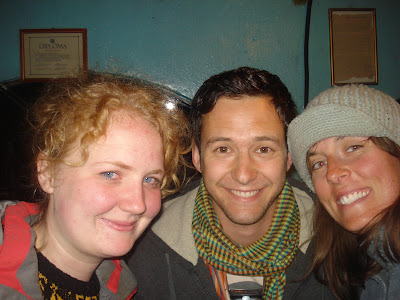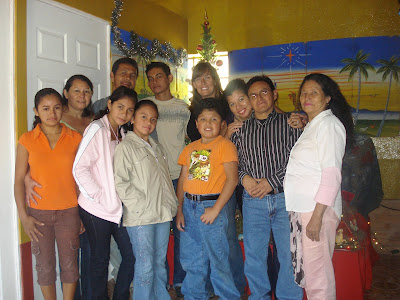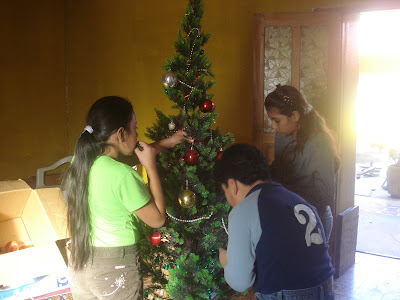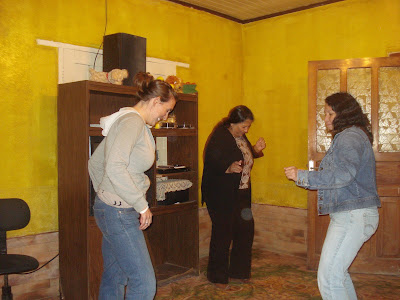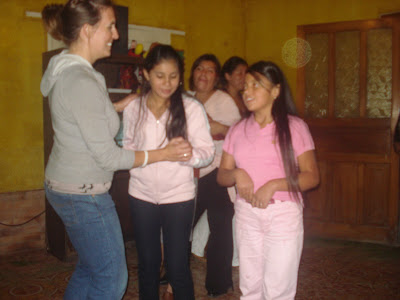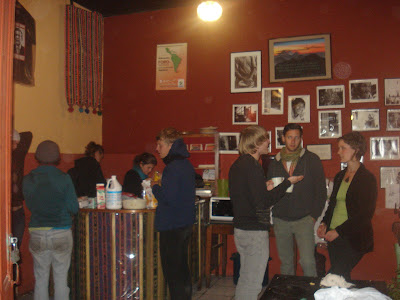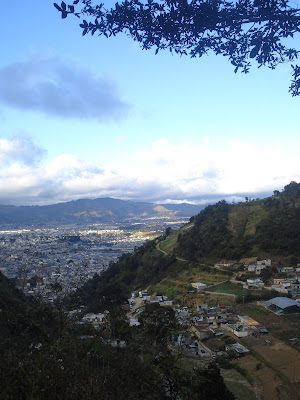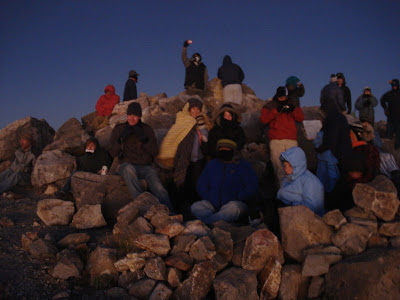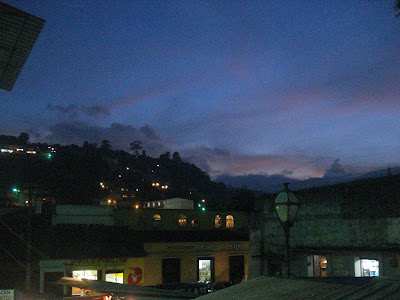If I were writing a book, the title of this week would be “Perspective”. I can hardly believe it’s only Wednesday. I started with my new family on Sunday afternoon. The poverty level at this new home is staggering. The house is roughly the size of the wooden deck at the house I grew up in on Gloucester Ct. On one side of the room is the wood-burning stove and table. On the other side of a half partition are two double-sized beds at best. The house is built of thick sheets of metal, with what appear to be trash bags or heavy plastic covering the gaps. The door is a hinged piece of tin. It is a family of 6, 2 parents, and children ages 13, 10, 7, and 5. The kids are bubbling over with happiness and excitement every time I come visit, and don’t seem bothered by their living situation. It’s their reality, and they know only that. They’re still kids who run and play and laugh and joke just like any others in what I know to be “better” living conditions. The family has been extremely hospitable this week, and again I am thankful for their patience, openness, and massive games of soccer and tag.
Because the economy has taken a beating here, it is difficult for a lot of the families to get work. Most of the men leave at 4 or 5 every morning to catch a bus to neighboring towns in hopes of finding work for the day. If they don’t get it, they still have to pay bus fare without replenishing an already small money supply. Often now, while the kids are out of school for break, the children, boys and girls, accompany their fathers to pick coffee and/or beans for the day. The pay varies by how much you pick, so more pounds equal more money. One thing that’s really great about the Mountain School is that our tuition goes directly to the families we stay with. It provides a source of income for the women in the community, helping their family’s economic situaion. You can actually see where your money goes every week. Life here makes that in Xela seem like that of privelaged royalty in comparison.
The conferences at the school this week were two of the most interesting speakers I’ve ever had the honor of hearing and brought much more clarity to how much I take for granted not only living in the States, but having been born there. I am lucky to be an American woman, to have the freedoms and choices I have.
Monday night, Enrique shared with us his experiences traveling to the U.S. in search of a better life. He explained in detail the 14-day journey, explaining that many Guatemalans leverage their homes to find the $5,000 (US) to pay a guide (called a coyote), to lead them through Mexico to the border. Paying this money is by no means a guarantee that they will make it through the Mexican checkpoints, let alone to the US border, or to a job. They had to learn Mexican Spanish, in order to be able to convince checkpoint police that they were Mexicans, and just passing through. If at any point they couldn’t get through a checkpoint, they could pay a bribe to continue the journey. A lot of the trip was taken hidden under layers of goods in a truck, where two fellow travelers nearly died from lack of air. They spent many days hiding in the desert, and nights covering as much ground on foot as possible. After a very long, stressful voyage, wrought with fear, hunger, and hope, the remaining American Dreamers made it across the border and into Arizona. As they were getting into cars to be transported elsewhere, the border police came, cuffed their hands and feet, and just like that the dream was over. After a few days in a holding facility, a meeting with the Guatemalan consulate, and a warning of future punishment if he came back illegally, he was deported back to Guatemala.
You would think that would be the end of it. But Enrique took the journey twice more in the same year, both times being sent back as well. He has two brothers who are in the U.S. who went at different times and are now living and working in the states, but whose families remain in Guatemala. I asked him if it was worth it for his brothers to have made it there, if it had bettered their lives as they had hoped. He said, without hesitation, that absolutely, it was worth it. Now they have work to feed and clothe their children. They will be able to afford to educate their children, and hopefully give their kids a brighter future. The kicker of it is, their American Dream is $5 per hour for intense manual labor. It’s not even minimum wage. The money they send home goes much further here, but in search of this dream most of them have left their wives and children behind.
I’ve never known what to think about illegal immigrants in the States. I haven’t really because their being there doesn’t affect me in a major way. But now, I have a little bit more perspective about their situation. It's a double edged sword.
On Wednesday afternoon, Juanita came to talk to us about life indigenous woman. She was married at age 13, to a boy who was 17, a deal made by their fathers. She thought it was a game. At the time she thought you got pregnant by talking to boys, and was told that having children was the same as playing with dolls. The only thing she felt when she had sex with her husband was an immense fear of him and what he was doing. She only knew she was pregnant 9 months later as she was giving birth and her mother said non-chalantly, “you’re going to be a mother”, then ran out the door to get the midwife. Juanita lived with a husband who was a stranger. She was happy every day when he went to work, and feared his return each night. He made every decision for her and their children. She had no opinion, no say, no voice. She, like most women here, was to stay in the house to cook, clean, raise the children, and ask for permission before doing anything outside of that. When pregnant with her third child she contemplated suicide, thinking it the only way out of a life she hated.
She never took her life because she realized how important her children were, but also that her life and her happiness were also priorities. In a brave move, she left her husband. Women do not leave their husbands here. It just doesn’t happen. Everyone told her to go back, that he would change. She knew it would be a great injustice to herself and her children if she did so. Life isn’t easy as a single mother, but she knows her children will have a better future. All she wants for her kids is for them to be able to get a great education, and someday be professionals. She wants them to choose who they marry and when they marry, if that’s what they want.
Now, Juanita works with five different women’s organizations hoping to strengthen women’s roles in society, and break through the traditional machismo thinking. It’s hard to change the men’s points of views, but she hopes that her work with youth programs will change the gender stereotypes of younger generations. The things she wants to change, and give to her own children are things I take for granted every day. Education. Choice of spouse. Career. Shelter. Freedom of speech. On and on and on.
I had quite an emotional reaction to the happenings of this week. Guatemala is pulling at my heart strings. I am so lucky. My life in the U.S. is severely blessed. I have never needed or wanted for anything. I take basic things for granted like clean running water and a house with four sturdy walls, basic needs that in my world are a given. I’ve never looked at the world from this perspective before, through the eyes of people whose reality is something I’ll never understand because I’ll never have to live it. But today, I have a different way of thinking about some stuff. And for that, I’m really thankful.









